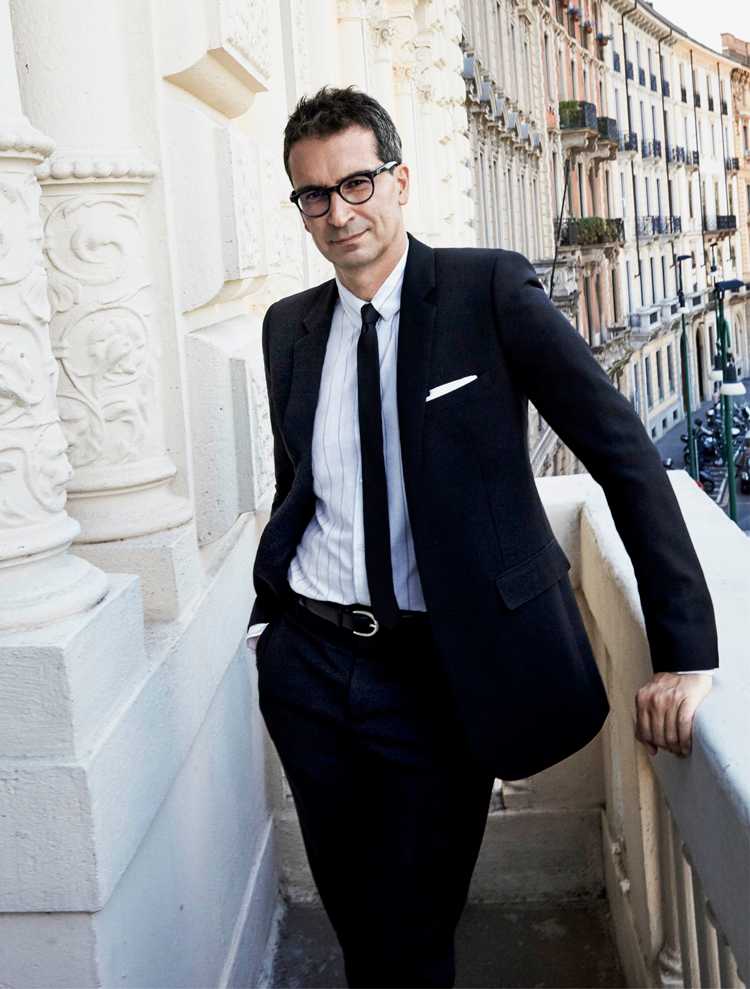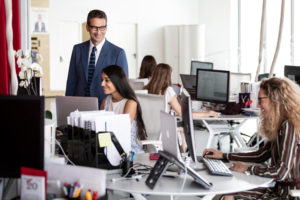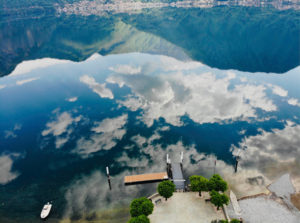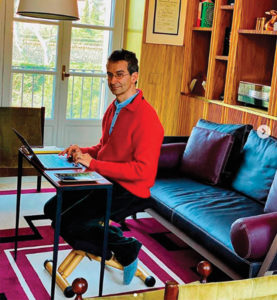Federico Marchetti, Chairman and Chief Executive Officer of YOOX NET-A-PORTER GROUP is one of those who are thriving during this new lifestyle we are all adapting to. With technology at the forefront of his business and an entrepreneurial mindset, Marchetti quickly adjusted to the “new normal”, immediately looking for solutions to adapt and transform his business model and find ways of smart-working for all his employees in order to continue the success of his company.

When he founded YOOX in 1999, Marchetti was ahead of the curve. He anticipated a huge change in consumer habits before many of us even had internet in our homes. His company grew quickly and in 2015 Marchetti successfully struck a merger with NET- A-PORTER founding YOOX NET-A-PORTER-GROUP.
Four years on and the group is the world’s leading online luxury fashion retailer and is going from strength to strength. With over 5,000 employees around the world, it is one of the fastest growing online companies in the world and in 2018 when YOOX NET-A- PORTER became part of Richemont, it was valued at six billion dollars.
While he is Italian, Federico Marchetti spends much of his time travelling the world and splits his living time between Milan and London. His wife is British and their daughter is bilingual, with a great experience of both cultures. With his fast-moving lifestyle it’s rare that this CEO has the chance to spend so much time at home. From his house in Italy, he shares with us his thoughts on the future of the fashion and e-commerce industry as well as the ways he believes the world has changed forever.
What does Italy mean to you personally?
Italy is my home. It’s my roots, my culture, my sensibility, my love for beauty. However, I am a man of technology and I know that to be able to invent a tomorrow, you must have had a past that you can then surpass, you must look ahead, and know how to live in the future. I feel like an Italian-American, or rather a Romagnolo-American. Romagnolo by birth, Italian by DNA, American by choice, because I studied at Columbia University and because my lifestyle and work are like those in the United States. Above all though, I’m someone who doesn’t like borders. I like to overcome them. And technology allows me to do this every day.

Tell us more about the importance of “Made in Italy” and why do you think there is such a fascination with this concept globally?
We (Italians) are modern artisans. We know how to design bridges, like Renzo Piano’s latest one, houses, furniture, clothing. We use creativity and rationality but, above all, we give a soul to our creations. Italians always put everything into what they create: their lives, their feelings, their emotional relationships. The result is always something that has an inner world, a strong aesthetic and an emotional component. There is never an aseptic environment in the workplace. Once the shifts are over, people share food, flavours, views and everything comes together in a circular process where the things you create are the result of who you are, where you live, who you love, what you have around you. The people who buy products that are Made in Italy, are buying a whole world, not just an object. It’s a unique experience, not just a purchase.
Italy has suffered greatly throughout the global pandemic we are currently experiencing – when all of this is over what do you expect to see from the recovery of this crisis?
A technological, connected, interactive world, but also one that has rethought its hierarchy of values, a world that has rediscovered the importance of community, participation, solidarity and respect for the environment and nature. A world that puts its focus on health, with a true understanding of the value of science and the expertise of doctors. Technology and the internet have been a great vehicle for this new sense of unity. Just think of the millions of people who have been using the internet every day, to talk to each other, for smart-working and homeschooling; all the hours of meetings that scientists have conducted online, exchanging vital information, diagnoses and treatment hypotheses. Then there’s the other end of the spectrum: people spending their time watching Instagram Lives and streaming movies. Technology has entered our homes and opened the world up to us.
Here and now, a new age has begun, one in which everyone will have to make a great technological leap. Twenty years ago, I created a company; YOOX, which was completely digital. I then transformed it, with the merger with Net-A-Porter, into the leading group globally for luxury e-commerce. I find myself in a privileged position because I have created an ever-changing path and, now, I can say that I have been able to face this crisis with all the appropriate tools.
Even the elderly have started to approach the internet, trying to do their grocery shopping online and are now in love with the experience. Less technological companies will have very little time to adapt. There will be many things that we will not do anymore as people, but that robots will do. Robots may not have feelings, but they are very useful as they can’t become infected by Covid-19.
When all of this is over will you be changing any of the strategy of YNAP and has it had an impact on how you will move forward?
We have moved a step ahead as only leading companies can do. The first decision we made was to extend smart working to all colleagues in our offices around the world, even before governments decided to lockdown cities. Our teams have worked day and night on various latitudes to find solutions quickly, always keeping our employees’ health as our top priority. We have learned from each other, we’ve been fast and reactive. Our biggest strength is that we are a technology group. Everything was ready. We knew how to do it. We know the Internet well. We are in perfect harmony with our customers, but we have always been innovators too. Technology, transparency, sustainability, entertainment and humanity are the keys to the future.
It’s time to experiment with emerging technologies, from virtual fitting services to digital showrooms, from Artificial Intelligence to Augmented Reality, avatars, visual recognition and all the tools that allow us to be closer to what our customers need. We have to be transparent and sustainable, but also entertaining. We have to show our human side. At YOOX NET-A-PORTER we have been working on this since 2009. We are ahead in this field, we use the most advanced technology and we collaborate with brands that have sustainability at their heart, just like we do. Our packaging includes fully recyclable materials and we have launched many sustainable projects, including one with HRH The Prince of Wales, The Modern Artisan Project, which merges sustainable practices with craftsmanship, data use and education. It brings together the most modern technology that you can imagine, with the most human and traditional practices. Consumers expect us to use robots and that information technology will become increasingly central, but they also want the emotional side. They ask us to be close to them, and to be knowledgeable and empathetic. They want to be understood and respected. They seek content and sensitivity. And we know how to satisfy them.

View from Federico’s home in Italy
Do you think it will impact the buying behaviour of customers?
It already is: The Beauty segment is displaying a growing share
of purchases across both female and male customers and this is consistent across all our sites (Net-A-Porter, YOOX, Mr Porter and The Outnet). Shoes appear to have a growing share of purchases mostly driven by male customers.
Within Ready To Wear, tops and shirts appear to be taking a growing share, and this is consistent across all our sites. Home design (including art and fine books) has a fast-growing share at YOOX.
Tell us about your 2030 sustainability plan.
I believe that the fashion industry needs to change its mentality and deeply rethink the concept of what fashion is. Fewer collections, less production, less waste. New creativity must be combined with a new sensitivity to protect the planet. Fashion will have to decide if it wants to enter a virtuous cycle where sustainability, respect for nature and circularity are its watchwords or not. At YOOX NET-A-PORTER we decided which side we wanted to be on a long time ago. And we will push it even more in the coming years.
When this situation is over, what is the first thing that you will do?
I don’t think there will be a zero hour, an X moment. Maybe when they find a vaccine, but some time will have passed by then and I’m not sure that at that point we will want to go back to our lives exactly as they were BC (Before Coronavirus). In the meantime, there will be a stop and start, some things we will do more, and some less. We will get used to managing risks and to preventing them. We will plan for and create the future.
Growing up, what are some of your first memories of Italy as a child?
Marina di Ravenna, the sea, swimming, the boats. Water is my element, my memory, the place where I like to be, that belongs to me and where I love to return.
Where in Italy do you like to travel to / your favourite city and why?
I love to travel by sea. I love Sicily, the Aeolian Islands, Tuscany, Ponza, but I never want to dock, I don’t look at the coast hoping to go ashore as soon as possible, in fact, I prefer the open sea.
Bruce Chatwin argued that travel is a profound necessity for the human being who is not satisfied with the reality they are living, for someone who must subvert the known, the certain, the here and the now. Travelling is the ability to become fluid, liquid, adhering to all the experiences of reality. In this sense, travel remains the opposite of tourism: it never guarantees to join two places, it certainly has a beginning, but its end is always uncertain, because its dimension is the during, made up of emotions, ideas and unexpected encounters. The journey is the Odyssey: in the end, Ulysses returns home, but he is no longer the same. And according to a minor version of the myth, it starts again.

Federico Marchetti at home during quarantine
Can you share with us any Italian traditions that you have with your family and friends?
As I said before, I am a Romagnolo-American, with an English wife and a bilingual daughter who corrects my phonetic mistakes. We have fun comparing different traditions, sayings and cultural differences. With my wife, we debate for hours about the air conditioning: she wants it on and I turn it off, we talk about Anglo-Saxon and Italian habits.
What is the motto you are living by during this time?
You can’t predict the future, you have to invent it.
What in your opinion are the prerequisites to success?
Only impossible challenges last forever. I was able to bring together two worlds that were apparently not compatible: luxury and technology. At first, they were wary of each other. Technology considered fashion too frivolous and evanescent, fashion considered tech too cold and unaffected. They are now inseparable lovers. We need to think big, look outside of ourselves, be global and avant- garde, dare, respond to needs before others. In Italy there are many small and medium-sized companies that need to grow, and technology can help them.
How are you spending your days while staying at home in this “quarantine mode”?
6:45 – Wake-up call (I decided not to change my habits, even if in smart working).
6:45 – 7:15 – Double check breaking news overnight and if there is any news from my Asian colleagues in Hong Kong, Shanghai or Tokyo. 7:15 – 8:00 – Yoga and posture exercises for my back pain (that’s why I use this special chair – I recommend it to anyone who suffers back pain!). Then I shower.
8:00 – 8:30 – Breakfast.
8:30 – 11:30 – Work on multiple tasks, mostly taking decisions with the Executive Committee on COVID-19 measures for our colleagues, customers and community.
11:30 – 12:00 – Italian classes, homeschooling with my daughter. 12:00 – 1:00 – Video calls with my colleagues in London and Milan, and catch up with my assistant.
1:00 – 1:30 – Lunch.
1:30 – 4:30 – Work, work, work (that’s what www stands for!).
4:30 – 5:00 – Break, for ‘merenda’.
5:00 – 7:00 – work with my colleagues in the USA.
7:00 – 8:30 – Dinner and catch up on world news.
8:30 – 10:30 – Video call with some Executive Committee members. 10:30 – 12:00 – Take a bath, watch a movie or read before sleep.
What’s your favourite Italian phrase?
Detto, fatto. It means ‘said and done’. Patience isn’t my best quality: I like to associate action to thought. I’m not a philosopher, I’m an entrepreneur, I follow speed and innovation.
How would you describe Italy in one sentence?
The Great Beauty.
What is a message that you would like to give to all the Italians that will be reading your interview?
In this crisis we have shown our best side: our extraordinary doctors and nurses have worked tirelessly, with passion and professionalism, moved by each recovered patient and crying for those who weren’t able to make it. We have been a model for the world to follow, but I would like to add another thing that concerns a great Italian: Leonardo da Vinci.
Leonardo was born and living in Vinci but went continuously to Florence, starting from a young age to overcome his personal borders, ending up in Milan, France and many other places. I’ve always wondered what Leonardo thought as he went back and forth to Tuscany, what he saw, how he felt. Then one day, walking in Silicon Valley, I found the answer: with an incomparable style and beauty, in his time, Leonardo saw in Tuscany what you can see today in California. An active ruling class, economic and cultural resources and a lingua franca that breaks down barriers and confuses styles, cultures, people. Then it was art, today it is technology. I see this in our future.
READ MORE:















